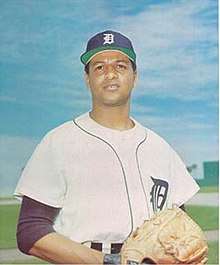Les Cain
Leslie Cain (born January 13, 1948) is an American former starting pitcher in Major League Baseball who played for the Detroit Tigers. He batted and threw left-handed. In a four-season career, Cain posted a 23–19 record with 303 strikeouts and a 3.98 earned run average (ERA) in 373 innings.[1] Cain was a promising pitcher who had his career cut short by an arm injury.
| Les Cain | |||
|---|---|---|---|
 | |||
| Pitcher | |||
| Born: January 13, 1948 San Luis Obispo, California | |||
| |||
| MLB debut | |||
| April 28, 1968, for the Detroit Tigers | |||
| Last MLB appearance | |||
| May 28, 1972, for the Detroit Tigers | |||
| MLB statistics | |||
| Win–loss record | 23–19 | ||
| Earned run average | 3.98 | ||
| Strikeouts | 303 | ||
| Teams | |||
Baseball career
In his 1968 rookie season with the Detroit Tigers, he went 1–0 with a 3.00 earned run average (ERA) in eight appearances, including four starts,[1] but he was out the following season after developing arm problems.
In 1970 Cain recorded 12 victories and 156 strikeouts in 1802⁄3 innings pitched, and finished 1971 with a 10–9 mark in 145 innings.[1]
On August 28, 1971, Cain hit the last home run by a Tigers pitcher before the American League adopted the designated hitter rule in 1973. A Tiger pitcher did not hit a home run again until 2005.[2]
Workman's compensation case
Cain contended he was forced to pitch by Detroit manager Billy Martin while he had a sore arm. Cain later claimed that it did permanent damage to his arm and he sued the Tigers. In a landmark decision, the Michigan Bureau of Workman's Compensation[2][3] ordered the Tigers to pay Cain $111 a week for the rest of his life.[2]
Personal life
Cain married Vera Nell Washington in 1968.[2] He has a son, Brian Earl Cain, and a grandson, Brian Earl Cain, Jr.[2]
References
- "Les Cain". Baseball-Reference.com. Retrieved June 10, 2011.
- Borawski, Brian (2008). "Les Cain". SABR Baseball Biography Project. Archived from the original on June 8, 2011. Retrieved June 10, 2011.
- Voigt, David Quentin (1983). American Baseball: From Postwar Expansion to the Electronic Age. Penn State Press. p. 263. ISBN 978-0-271-00332-0.